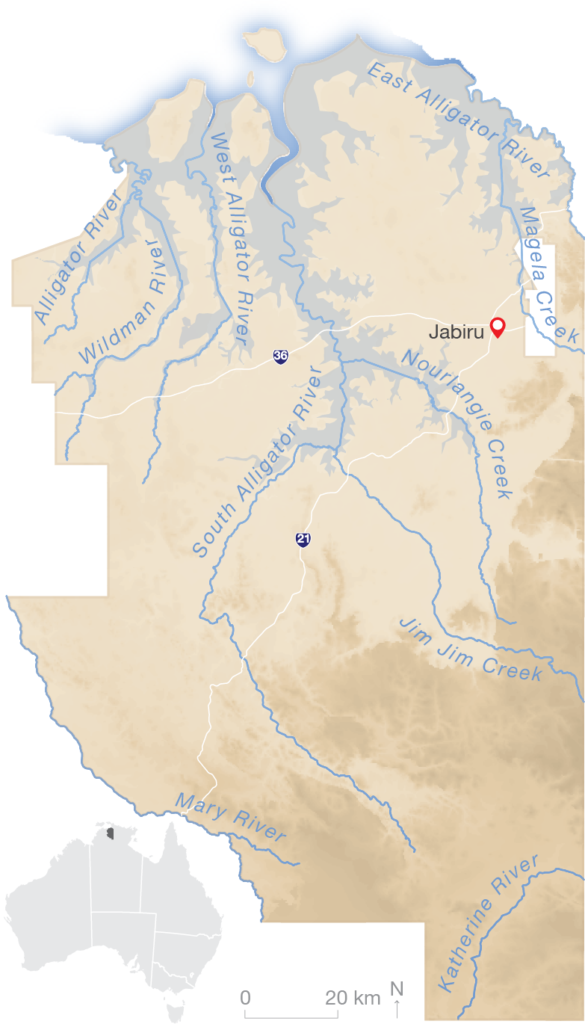As in other protected areas around Australia, staff and Traditional Owners in Kakadu National Park are committed to working together to protect the health of important values of Country. However, information has been limited on how to jointly assess the health of Country to guide effective co-management activities. To care for important areas, cross-cultural monitoring and evaluation frameworks need to be co-designed and trialled with Indigenous partners to develop appropriate measures of success, data-sharing processes and methods for identifying priority management actions.
This Indigenous-led action-research project focused on the development and trial application of Bininj and Mungguy healthy Country indicators in Kakadu National Park (Indigenous people are known as Bininj in the north of the park and Mungguy in the south; Bininj/Mungguy will be used from now on). The research project was governed by a Bininj/Mungguy steering committee made up of Traditional Owner representatives from all the clans across the park.
The steering committee chose two pilot areas where the project team worked with Bininj/Mungguy to undertake targeted field studies to identify Indigenous values and the indicators used to track the health of Country before and after agreed on-ground management activities. Under the direction of the steering committee and the Traditional Owners for Nardab and Jarrangbarnmi, five indicators were identified to assess sites and guide adaptive management of important landscapes within the jointly managed and Ramsar- and World Heritage Area-listed park.
The indicators were:
Together with Bininj/Mungguy Traditional Owners and rangers, the project team trialled an approach for monitoring and reporting on healthy Country indicators before and after agreed on-ground actions. Read on to find out how these indicators were used to monitor and evaluate weed management activities on the Nardab floodplain and landscape burning activities at Jarrangbarnmi (Koolpin Gorge).
This project:

The Northern Australia Environmental Resources Hub addressed key research questions to come up with practical, on-ground solutions to some of the north’s most complex environmental challenges. A transdisciplinary research approach has been at the heart of the hub. Integrating key research users – policy-makers and land managers including Traditional Owners and ranger groups – into the co-design of research projects has led to rapid uptake of research outcomes into land management practices and decision-making. The hub has produced this wrap-up video outlining these impacts from the perspectives of research users.
Indigenous people face many challenges in managing their lands, including rapidly growing threats causing species extinctions and ecosystem losses. In response, many Indigenous groups are looking for ethical ways to design and apply innovative technologies to solve complex environmental management problems—specifically, technology that can work with Indigenous people’s stewardship practices and knowledge.
NESP researchers have built on long-term collaborations with Bininj Traditional Owners to develop and apply Bininj indicators of cultural-ecosystem health for the floodplains. These indicators are being used to identify priority areas for targeted para grass control and monitor the effectiveness of treatments.
Kakadu NESP Team Eureka Prize for STEM Inclusion finalists.
NESP researchers have built on long-term collaborations with Bininj/Mungguy Traditional Owners to develop and apply Bininj/Mungguy indicators of cultural-ecosystem health for the floodplains. These indicators are being used to identify priority areas for targeted para grass control and monitor the effectiveness of treatments.
This project, stage two of the Indigenous NRM in Kakadu project, was led by Dr Cathy Robinson from CSIRO in conjunction with the Bininj/Mungguy Steering Committee.
Dr Robinson was supported by researchers from The University of Western Australia, Charles Darwin University, CSIRO and by Bininj/Mungguy Traditional Owners and rangers.
Contact:
Cathy Robinson, CSIRO
E: catherine.robinson@csiro.au

